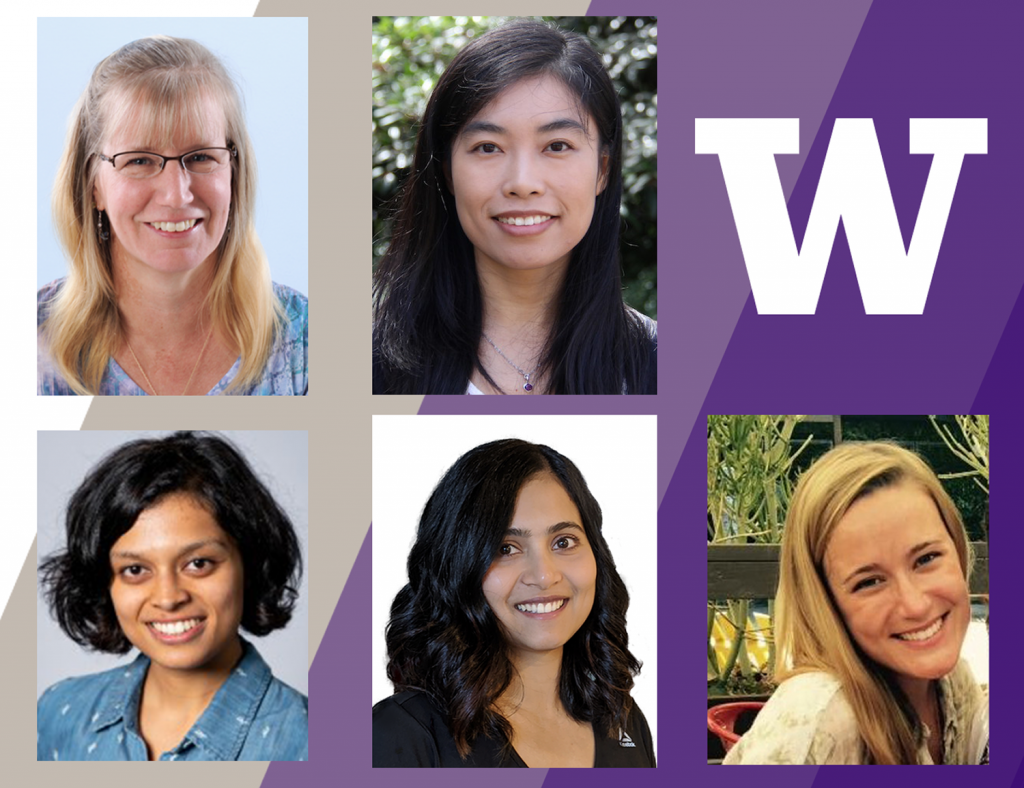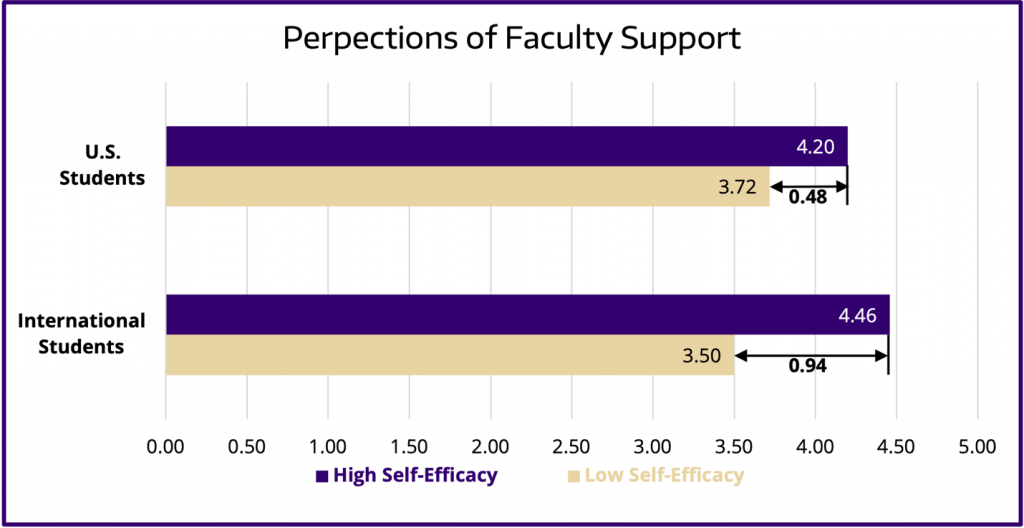Do international university students experience the engineering classroom differently from that of their domestic peers?
To help answer this question, a research team led by UW ECE Professor Denise Wilson and Ziyan Bai, Ph.D. (UW College of Education), in collaboration with graduate students Shruti Misra and Neha Kardam from UW ECE and Morgan Anderson from the UW College of Education, published a paper that provides in-depth analysis in helping to understand such differences in experiential learning perception, both before and during the COVID-19 pandemic.

UW research team members, clockwise from left to right: Denise Wilson, Ziyan Bai, Morgan Anderson, Neha Kardam, Shruti Misra
The research and accompanying paper were inspired by the overwhelming concerns over the impact of COVID on international students’ learning experience in the U.S. and the potential gloomy forecast of future prospective international student applicant pools. Besides logistical and immigration burdens, international students in engineering rely heavily on support from faculty members and teaching assistants (TA) to be successful. This research highlights the important role of faculty and TAs to international students and concludes with promising instructional practices for faculty and TAs to better support international students in engineering.
The team’s paper won awards both for Best Diversity Paper and 2nd Best Paper in the New Engineering Educator’s Division at the recent 2021 American Society for Engineering Education (ASEE) Annual Conference and Exposition. Featuring more than 400 technical sessions and thousands of authors and speakers, the ASEE Annual Conference and Exposition is the only conference dedicated to all disciplines of engineering and engineering technology education, and is the premier event of its kind. The ASEE divisions include best paper and diversity awards, and the fact that the UW team’s paper involved elements of both speaks to the high quality of the work and the importance of their findings.
To gather their results, the UW team surveyed over 1,200 students from 19 different UW ECE courses between 2016 and 2020. They investigated three primary questions:
- Do international students perceive faculty support differently than domestic students?
- Do international students perceive TA support differently than domestic students?
- Do international students experience positive emotional engagement in the classroom differently than domestic students?
After the team gathered and began to analyze the results, they were able to make several notable conclusions. First and foremost, the survey data highlights the fact that both faculty support and TA support are equally important for student success, regardless of whether students are engaged in traditional or remote learning.
However, faculty support was more sensitive to self-efficacy (akin to self-confidence within the engineering discipline) for international students than for domestic students, implying that building self-efficacy among international students can help them to make the most out of what faculty provide. International students also generally perceived TA support as being higher than that of U.S. students and their positive emotional engagement (how students feel as they engage in their studies) was also more sensitive to that support.

Diagram depicting differences between international student and U.S. student reports of self-efficacy and perceptions of faculty support during COVID.
Based on the findings of the study, the specifics of how faculty and TAs interact and engage with students in their engineering courses is likely to impact international students more strongly in certain ways than is the case for their domestic peers. These results call for higher education institutions to strive to be more sensitive to international students’ instructional needs, whether involved in traditional, remote, or hybrid learning models.
Administrators, advisers, and instructors alike should try to create opportunities to enhance the engagement of international students in course-based activities. Considering how much international students rely on faculty and TAs, as well as their peers, for academic support, faculty and TAs are encouraged to learn more about international students’ particular needs and stress factors, and also identify and utilize inclusive teaching pedagogical methods.
Interestingly, international students often benefited from remote learning. For example, one international student commented during an interview:
“They [the effective teachers] broke things down easily, made themselves available to me with office hours and questions, and I feel like I learned much more during that time. So, I was actually happy with remote learning. In one of my classes, one professor stayed with us for three hours, helping us with the final project because we didn’t know what we were doing and I remember learning a lot [during that time]. She made herself available to us, and I don’t know how it would’ve worked out if it hadn’t been remote.”
And regardless of setting, international students called for faculty and TAs to take the time to understand where they were coming from:
“They [the effective teachers] are willing to explore the topic further with me if I have questions that they’re not prepared for. If they can’t see it my way [at first] they might be like, “Oh, that’s a good question,” and then they’re willing to change their own ‘flow’ when I am coming from a different perspective, and are willing to go there with me a little.”
Faculty and TAs are already well-positioned to facilitate better communication with international students and implement several useful strategies. These include clarifying expectations, providing visual and oral support and written notes, and offering more constructive feedback. Faculty and TAs should make a concerted effort to get to know the international students in their classrooms on a personal level and reach out to those students who are not actively participating in classroom activities.
“Through working and interacting with hundreds of international students each year, I appreciated learning about their unique perspectives and their contribution to the U.S. higher education.” – Ziyan Bai, Ph.D.

photo by Zen Chung | Pexels
To encourage and facilitate international student participation, faculty and TAs can consider giving more time for students to prepare before a discussion, listen actively, and provide opportunities for students to understand the purpose of tasks and assignments. Furthermore, educators in higher ed are encouraged to familiarize themselves with community resources and opportunities for international students to engage outside of classrooms, considering that social connections with the host country increases these students’ overall confidence.
“I have always been dedicated to supporting international student success through research and professional work,” said Bai, the paper’s first author. “In the past seven years, through working and interacting with hundreds of international students each year, I appreciated learning about their unique perspectives and their contribution to the U.S. higher education.”
Moving forward, the team plans to continue analyzing the data to understand how different groups, many of which are under-represented in engineering, experience the engineering classroom on a personal level, and are particularly interested in international students and under-represented gender and racial/ethnic groups.
For more information, please visit the team’s COVID-19 research website or contact Professor Denise Wilson at denisew@uw.edu or Ziyan Bai at baiziyan@uw.edu.
Ryan Hoover | UW ECE News

